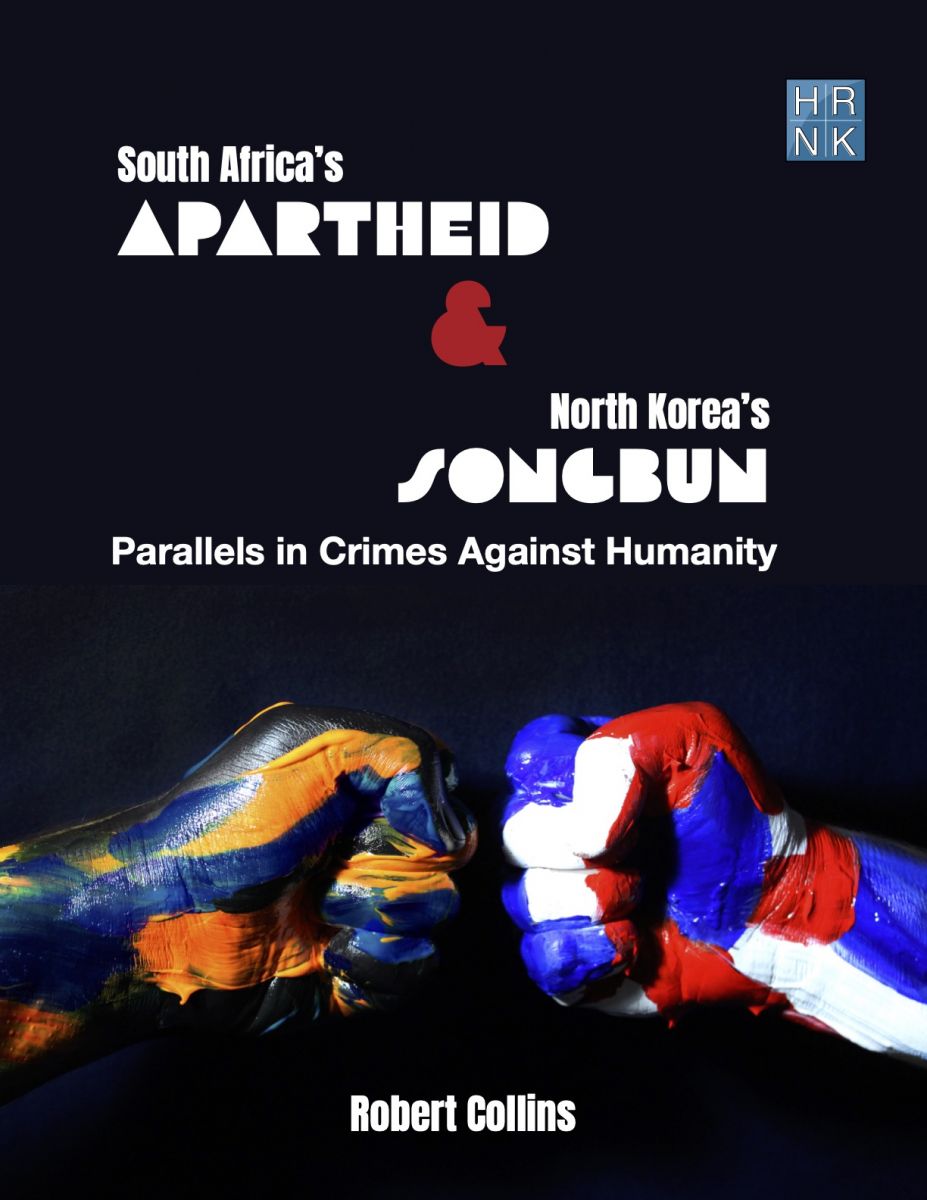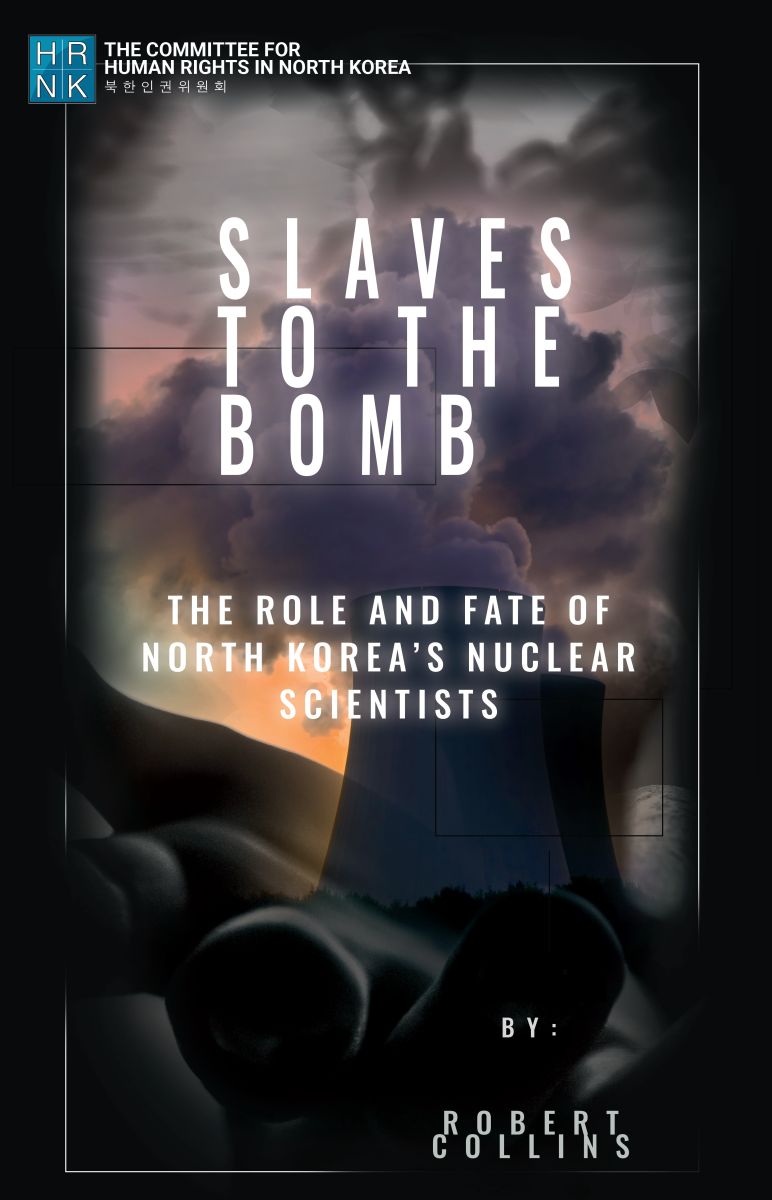NEW HRNK REPORT HIGHLIGHTS SIMILARITIES BEETWEEN TWO SYSTEMATICALLY, DELIBERATELY, AND THOROUGHLY DISCRIMINATORY REPRESSIVE SYSTEMS
THE REPORT IS AVAILABLE AS A PDF FILE THROUGH HRNK’S WEBSITE:
https://www.hrnk.org/publications/hrnk-publications.php

The Committee for Human Rights in North Korea (HRNK) releases today a comprehensive study establishing parallels between North Korea’s loyalty-based songbun social classification system and South Africa’s apartheid. South Africa’s Apartheid and North Korea’s Songbun: Parallels in Crimes against Humanity is the sixth and latest installment in a series of reports by Robert Collins, all aimed to deconstruct and explain the leadership structure mechanisms and levers of power of North Korea and their profound interconnection with the Kim regime’s policy of human rights denial.
The latest Collins report reflects the author’s unparalleled understanding of the North Korean regime and the depth of his analysis of North Korea’s policy of human rights denial, this time scrutinized next to South Africa’s apartheid. A decades-long resident of South Korea and fluent Korean speaker, the author said “the report was inspired by a statement made by former UN High Commissioner for Human Rights Navanethem ‘Navi’ Pillay at an October 2015 conference in Seoul.” According to Collins, Pillay told the audience that North Korea’s songbun was a new instance of apartheid and called for its dismantlement.
Collins points out: “In both South Africa and North Korea, one was socially and politically classified at the time of birth - one based on race and one based on what one's father or grandfather's status was on August 15, 1945.” According to Collins, “both apartheid and songbun negatively impacted housing, education, employment, marriage and opportunity of specifically targeted segments of the population.”
The report provides invaluable insight for decision makers, diplomats, scholars, and human rights defenders. HRNK Director of Programs and Editor Rosa Park recognized that “thanks to Robert Collins’ thought-provoking analysis, we are able to better understand the sheer brutality of the Kim regime’s system of songbun social classification through this comprehensive comparison with South Africa’s similarly brutal system of apartheid.”
Amanda Mortwedt Oh, HRNK Human Rights Attorney considers the report to be “the most comprehensive examination of whether the crime of apartheid may be perpetrated in North Korea based on the Kim family's songbun system.” Just like apartheid before, songbun continues to crush the people of North Korea, through the drafting, application and implementation of laws and a legal system absolutely controlled by one party. In the case of South Africa, the fundamental distinctive feature of apartheid was race. In the case of North Korea, that distinctive feature is perceived loyalty to the regime.
Author Robert Collins cautions that “both apartheid and songbun are judged to be crimes against humanity, but one is internationally condemned and the other is internationally ignored.”
To that point, HRNK Executive Director Greg Scarlatoiu emphasized that “Collins’ report reminds us that it was coordinated, unwavering international action that put an end to South Africa’s abysmal racial discrimination system.” Scarlatoiu further noted: “It is only thoroughly organized, coordinated, methodical, patient, unrelenting international pressure and action that can bring about the removal of the songbun system, together with freedom, justice, and human rights for the people of North Korea.”
RELEASE DETAILS
The report launch and presentation by Robert Collins will be held via Zoom virtual conference, from 6 to 7 pm Eastern, on Thursday, February 25. Greg Scarlatoiu, HRNK Executive Director will moderate. You can still RSVP for the event here: https://forms.gle/VhtBp5WHo5iHniWk6.
If you are unable to participate, a video recording will be made available on HRNK’s YouTube channel after the event here: https://youtube.com/committeehrnk.
The report release is ON-THE-RECORD. For media inquiries contact Greg Scarlatoiu at [email protected] or author Robert Collins directly at [email protected].
HRNK was founded in 2001 as a nonprofit research organization dedicated to documenting human rights conditions in the Democratic People’s Republic of Korea (DPRK), as North Korea is formally known. Visit www.hrnk.org to find out more.
This is the first satellite imagery report by HRNK on a long-term political prison commonly identified by researchers and former detainees as Kwan-li-so No. 18 (Pukch'ang).
This report was concurrently published on Tearline at https://www.tearline.mil/public_page/prison-camp-18.
To understand the challenges faced by the personnel who are involved in North Korea’s nuclear program, it is crucial to understand the recruitment, education, and training processes through the lens of human rights. This report offers a starting point toward that understanding.
North Korea’s scientists and engineers are forced to work on the nuclear weapons program regardless of their own interests, preferences, or aspirations. These individuals may be described as “moder
In this submission, HRNK focuses its attention on the following issues in the DPRK:
- The status of the system of detention facilities, where a multitude of human rights violations are ongoing.
- The post-COVID human security and human rights status of North Korean women, with particular attention to sexual and gender-based violence (SGBV).
- The issue of Japanese abductees and South Korean prisoners of war (POWs), abductees, and unjust detainees.
This report provides an abbreviated update to our previous reports on a long-term political prison commonly identified by former prisoners and researchers as Kwan-li-so No. 25 by providing details of activity observed during 2021–2023.
This report was originally published on Tearline at https://www.tearline.mil/public_page/prison-camp-25.
This report explains how the Kim regime organizes and implements its policy of human rights denial using the Propaganda and Agitation Department (PAD) to preserve and strengthen its monolithic system of control. The report also provides detailed background on the history of the PAD, as well as a human terrain map that details present and past PAD leadership.

HRNK's latest satellite imagery report analyzes a 5.2 km-long switchback road, visible in commercial satellite imagery, that runs from Testing Tunnel No. 1 at North Korea's Punggye-ri nuclear test facility to the perimeter of Kwan-li-so (political prison camp) no. 16.
This report proposes a long-term, multilateral legal strategy, using existing United Nations resolutions and conventions, and U.S. statutes that are either codified or proposed in appended model legislation, to find, freeze, forfeit, and deposit the proceeds of the North Korean government's kleptocracy into international escrow. These funds would be available for limited, case-by-case disbursements to provide food and medical care for poor North Koreans, and--contingent upon Pyongyang's progress
For thirty years, U.S. North Korea policy have sacrificed human rights for the sake of addressing nuclear weapons. Both the North Korean nuclear and missile programs have thrived. Sidelining human rights to appease the North Korean regime is not the answer, but a fundamental flaw in U.S. policy.
(Published by the National Institute for Public Policy)

North Korea’s forced labor enterprise and its state sponsorship of human trafficking certainly continued until the onset of the COVID pandemic. HRNK has endeavored to determine if North Korean entities responsible for exporting workers to China and Russia continued their activities under COVID as well.
George Hutchinson's The Suryong, the Soldier, and Information in the KPA is the second of three building blocks of a multi-year HRNK project to examine North Korea's information environment. Hutchinson's thoroughly researched and sourced report addresses the circulation of information within the Korean People's Army (KPA). Understanding how KPA soldiers receive their information is needed to prepare information campaigns while taking into account all possible contingenc
This report is part of a comprehensive long-term project undertaken by HRNK to use satellite imagery and former prisoner interviews to shed light on human suffering in North Korea by monitoring activity at political prison facilities throughout the nation. This is the second HRNK satellite imagery report detailing activity observed during 2015 to 2021 at a prison facility commonly identified by former prisoners and researchers as “Kwan-li-so No. 14 Kaech’ŏn” (39.646810, 126.117058) and
This report is part of a comprehensive long-term project undertaken by HRNK to use satellite imagery and former prisoner interviews to shed light on human suffering in North Korea by monitoring activity at civil and political prison facilities throughout the nation. This study details activity observed during 1968–1977 and 2002–2021 at a prison facility commonly identified by former prisoners and researchers as "Kyo-hwa-so No. 3, T'osŏng-ni" and endeavors to e
This report is part of a comprehensive long-term project undertaken by HRNK to use satellite imagery and former detainee interviews to shed light on human suffering in the Democratic People’s Republic of Korea (DPRK, more commonly known as North Korea) by monitoring activity at political prison facilities throughout the nation. This report provides an abbreviated update to our previous reports on a long-term political prison commonly identified by former prisoners and researchers as Kwan-li-so<
Through satellite imagery analysis and witness testimony, HRNK has identified a previously unknown potential kyo-hwa-so long-term prison-labor facility at Sŏnhwa-dong (선화동) P’ihyŏn-gun, P’yŏngan-bukto, North Korea. While this facility appears to be operational and well maintained, further imagery analysis and witness testimony collection will be necessary in order to irrefutably confirm that Sŏnhwa-dong is a kyo-hwa-so.

"North Korea’s Long-term Prison-Labor Facility Kyo-hwa-so No. 8, Sŭngho-ri (승호리) - Update" is the latest report under a long-term project employing satellite imagery analysis and former political prisoner testimony to shed light on human suffering in North Korea's prison camps.

Human Rights in the Democratic Republic of Korea: The Role of the United Nations" is HRNK's 50th report in our 20-year history. This is even more meaningful as David Hawk's "Hidden Gulag" (2003) was the first report published by HRNK. In his latest report, Hawk details efforts by many UN member states and by the UN’s committees, projects and procedures to promote and protect human rights in the DPRK. The report highlights North Korea’s shifts in its approach
South Africa’s Apartheid and North Korea’s Songbun: Parallels in Crimes against Humanity by Robert Collins underlines similarities between two systematically, deliberately, and thoroughly discriminatory repressive systems. This project began with expert testimony Collins submitted as part of a joint investigation and documentation project scrutinizing human rights violations committed at North Korea’s short-term detention facilities, conducted by the Committee for Human Rights












